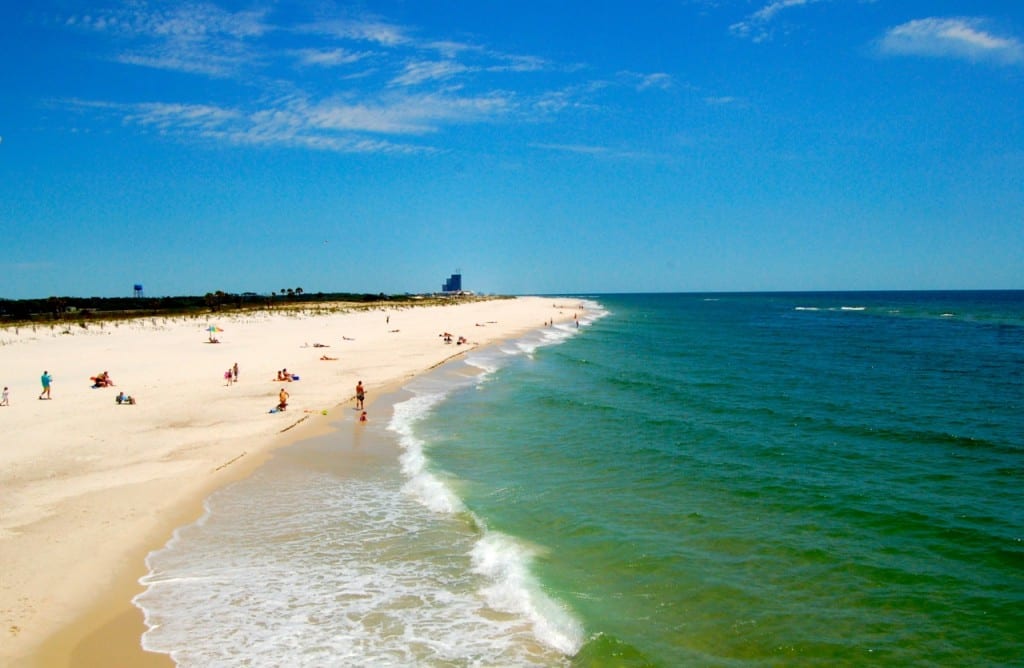
A view of the Gulf State Park beach from the fishing pier — before BP’s oil hit in 2010: Glynn Wilson
The Big Picture
–
By Glynn Wilson –
It’s been about three years since BP’s Deepwater Horizon oil platform exploded in the Gulf of Mexico on April 20, 2010. By the time engineers finally figured out how to cap the Macondo well in July, it had leaked 4.9 million barrels or 210 million gallons of crude into the Gulf and created the largest and most devastating environmental disaster in the history of industrial development, far surpassing the Exxon Valdez oil spill in Prince Williams Sound, Alaska, in the spring of 1989.
It was also a massive economic disaster for businesses along the coast, and the human health effects are still being calculated.
The Obama administration pledged that British Petroleum, Transocean and Halliburton, the three multi-national corporations responsible for the disaster, would pay the price to clean up the Gulf and the coast and compensate the businesses and people impacted.
The trial of the century is underway in New Orleans, and the case could end up costing the corporations up to $21 billion before its all over.
Due to the Obama administration’s insistence that BP pay, as part of an agreement with the U.S. government the company set aside $1 billion for coastal restoration projects. Under the Natural Resource Damage Assessment required by the Oil Pollution Act, the state of Alabama is supposed to receive $100 million.
Not being that bright, or schooled in the law, what did Alabama’s Republican governor and the legislature decide to do with the money?
Something they’ve been chomping at the bit to do for several years, since a natural disaster, Hurricane Ivan, blew down the crown jewel state park and convention center in Gulf Shores in 2004. They voted last week to use $85 and a half million dollars of the $100 million NOT to clean up the state’s portion of the Gulf or restore beaches and wetlands contaminated by the oil and the chemical dispersants sprayed to sink the oil onto the sea floor and to the bottom of Mobile Bay, Weeks Bay and Perdido Bay, hiding it from public view so the tourism dollars could continue to flow.
They voted to use the money to build a hotel and conference center on the beach at Gulf State Park.
Perhaps someone should go to Montgomery and brief the Republicans on the difference between a natural disaster and a man-made disaster. While they’re at it, perhaps someone should school them in the law. You can’t use money set aside under the law for coastal restoration for “economic development.” Those two things are not one and the same.
But of course “economic development” has been the battle cry in this state since the South lost the Civil War.
Even the state’s newspapers and television news stations are all for it, since BP spent millions of dollars advertising with them over the past three years keeping some of them afloat. The Bush Great Recession had already put a crimp in the budget for the Newhouse papers in Mobile, Birmingham and Huntsville, forcing them to shut down the daily print operation. If not for all that BP ad money, the Mobile Press Register, the Birmingham News and the Huntsville Times might have gone out of business completely. Instead they fired most of the experienced staff and hired young bloggers for cheap and are counting on building a monopoly for news in the state online at al.com.
Now they appear to to be all onboard with the goobernor’s plan for the BP oil money. But somehow I doubt even the conservative courts in Alabama will go along with this plan to raid the coastal restoration fund for economic development purposes.
Readers may recall the plan by the last Republican governor to build a fancy, smancy hotel and spa on the site. A lawsuit stopped that plan in its tracks, in part because the mandate for state-owned parks is for easy, affordable access by average, working folks in the state. Riley’s plan would have created a state-owned mecca for rich folks, and even the competing private hotel developers were not for it.
That is being talked about again with Republican Robert Bentley’s plan too, although he sort of let the rich fat cat stick his head out of the proverbial bag last week when he said, and I swear I’m not making this up: “I’m tired, as a governor, to travel to Sandestin, Florida to speak to doctors and lawyers in Sandestin who are Alabama doctors and lawyers. I want the money that they spend in Sandestin to be spent along our shores and to be spent in Gulf Shores and Orange Beach and the areas of Baldwin County.”
Excuse me for asking. But has the governor and his doctor and lawyer buddies never heard of the Hilton Garden Inn in Orange Beach?
So the BP oil money to fix the coast for wildlife, so people would have some nature to gawk at when they visit the coast, is now going to be used so that doctors and lawyers can look out the window at the sunset when they have meetings on how to screw people out of even more of their money?
Only in Alabamaland.
The Natural Resources Damage Assessment says BP and its corporate cohorts must pay for all damages to the Gulf of Mexico. That does include the loss of public access. But only $8.2 million of the $100 million was proposed by the legislature to be spent on shoreline and oyster reef restoration projects. There is nothing in the bill to clean Gulf waters, beaches or wetlands or restore wild bird habitat, for example. Building an expensive, exclusive resort would limit public access, not enhance it.
The National Wildlife Federation and other groups dedicated to using the money to bring back the environment on the coast are going to fight the plan.
“The American public expects to see BP’s oil spill money spent on projects that will restore the health of the Gulf Coast, not on pork-barrel projects like a convention center,” the National Wildlife Federation said in a statement.
“We are more than just a little bit disappointed in Mayor Robert Craft for his involvement in Gov. Robert Bentley’s and Sen. Tripp Pittman’s plan to misappropriate 80 percent of the $100 million dollars in Early Restoration Funds from the NRDA process to build a convention center and hotel at Gulf State Park,” according to a statment issued by a coalition of groups on Facebook as Alabama Coast United. They are asking the governor and legislature to reconsider this “pet, pork project.”
“The Baldwin County Alabama community leaders in Gulf Shores, and Orange Beach were given an unprecedented opportunity to lead the Gulf Coast in restoring the ecosystem BP has, and continues to damage, since the 2010 Deep Water Horizon disaster. There are oil mats off, and near shore that this money could be used to remediate, and remove from the Gulf waters,” the group said in a statement. “The governor, instead of fixing the damage, with no public input, and no environmental impact study that we know of, has decided to cause more damage by disturbing land that has been reclaimed by nature since the original convention center and hotel were destroyed by Hurricane Ivan in 2004.
“The governor should be leading the way to restore the ecology of the beaches,” the group says. “Instead he and the state legislature have chosen to increase the carbon footprint and increase environmental impacts.”
The habitat of Gulf State Park has now been reclaimed by its intended occupants like the endangered Alabama Beach Mouse, nesting birds, rabbits and a host of other creatures that call the dunes home, the group says.
“The purpose of the $100 million in Natural Resource Damage Assessment funding can be used for 2 purposes: paying for the assessment, and to recover natural resources that were harmed by the spill. The responsible parties are only required to fix what was injured by the oil disaster,” the group’s statement continues. “The NRDA process under Federal Regulations does not include economic development, nor does this project qualify under the loss of use due to the oil disaster. The fund from the Clean Water Act fines via The Restore Act covers economic development.”
In an e-mail response to my questions about this, Rep. Steve McMillan from Bay Minette, who orchestrated the bill through the House, said the hotel and convention center would “not be a high rise.”
Stay tuned to see how this controversy plays out.
Before you continue, I’d like to ask if you could support our independent journalism as we head into one of the most critical news periods of our time in 2024.
The New American Journal is deeply dedicated to uncovering the escalating threats to our democracy and holding those in power accountable. With a turbulent presidential race and the possibility of an even more extreme Trump presidency on the horizon, the need for independent, credible journalism that emphasizes the importance of the upcoming election for our nation and planet has never been greater.
However, a small group of billionaire owners control a significant portion of the information that reaches the public. We are different. We don’t have a billionaire owner or shareholders. Our journalism is created to serve the public interest, not to generate profit. Unlike much of the U.S. media, which often falls into the trap of false equivalence in the name of neutrality, we strive to highlight the lies of powerful individuals and institutions, showing how misinformation and demagoguery can harm democracy.
Our journalists provide context, investigate, and bring to light the critical stories of our time, from election integrity threats to the worsening climate crisis and complex international conflicts. As a news organization with a strong voice, we offer a unique, outsider perspective that is often missing in American media.
Thanks to our unique reader-supported model, you can access the New American journal without encountering a paywall. This is possible because of readers like you. Your support keeps us independent, free from external influences, and accessible to everyone, regardless of their ability to pay for news.
Please help if you can.
American journalists need your help more than ever as forces amass against the free press and democracy itself. We must not let the crypto-fascists and the AI bots take over.
See the latest GoFundMe campaign here.
Don't forget to listen to the new song and video.
Just because we are not featured on cable TV news talk shows, or TikTok videos, does not mean we are not getting out there in search engines and social media sites. We consistently get over a million hits a month.
Click to Advertise Here

















